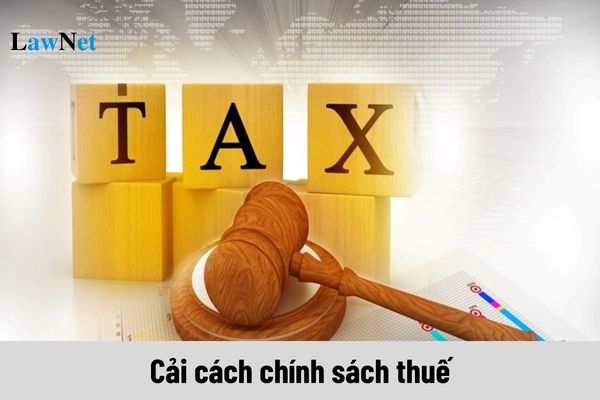What are the specific objectives for tax policy reform according to the tax system reform strategy by 2030 in Vietnam?
What are the specific objectives for tax policy reform according to the tax system reform strategy by 2030 in Vietnam?
According to Clause 1, Section 2, Article 1 of Decision 508/QD-TTg 2022, the objectives of tax policy reform under the tax system reform strategy by 2030 are as follows:
- Completely align Vietnam's tax policy system with the standards of a good tax system to ensure it is in line with international practices and, at the same time, meet resource requirements for the implementation of the 10-year socio-economic development strategy for the 2021 – 2030 period, including the following main taxes, fees and charges:
+ Value-added tax;
+ Special consumption tax;
+ Import and export duty;
+ Corporate income tax;
+ Personal income tax;
+ Severance tax;
+ Agricultural land tax;
+ Non-agricultural land tax;
+ Environmental protection tax;
+ Fees, charges and other collections remitted into the state budget.
Regarding the volume of budget revenues from taxes and fees, ensure the rate of taxes and fees remitted into the state budget is at a stable, reasonable level and in line with the socio-economic development strategy for each five-year period of 2021 - 2025 and 2026 – 2030. Particularly, in the first five-year period, focus on supporting businesses and people to overcome difficulties and restore their production and business activities adversely affected by the Covid-19 epidemic, specifically as follows:
- By 2025, the average ratio of state budget revenues is expected to make up at least 16% of GDP, including taxes and fees accounting for about 13 - 14% of GDP; the proportion of domestic revenue to total state budget revenue strives to reach about 85-86%. In the first period, focus on supporting businesses and the population in mitigating difficult situation and restoring their production and business activities adversely affected by the Covid-19 epidemic.
- By 2030, the average ratio of state budget revenues is expected to make up about 16 - 17% of GDP, including taxes and fees accounting for about 14 - 15% of GDP; the proportion of domestic revenue to total state budget revenue strives to reach about 86-87%.

What are the specific objectives for tax policy reform according to the tax system reform strategy by 2030 in Vietnam? (Image from Internet)
What do tax authorities in Vietnam include?
According to Article 2 of the Tax Administration Law 2019:
Regulated entities
1. Taxpayers include:
a) Organizations, households, household businesses and individuals paying taxes in compliance with provisions on taxation;
b) Organizations, households, household businesses, individuals paying other amounts to the state budget;
c) Organizations and individuals deducting tax from income.
2. Tax authorities, including:
a) General Department of Taxation, Departments of Taxation of provinces, and Sub-departments of Taxation of districts;
b) General Department of Vietnam Customs, Departments of Customs, Post Clearance Audit Departments, Sub-department of Customs.
3. Tax officials and customs officials (hereinafter referred to as “tax officials”).
4. Other relevant state agencies, organizations and individuals.
Thus, the current tax authorities include the following two groups:
- General Department of Taxation, Departments of Taxation of provinces, and Sub-departments of Taxation of districts;
- General Department of Vietnam Customs, Departments of Customs, Post Clearance Audit Departments, Sub-department of Customs.
What are the responsibilities of tax authorities in tax-related international cooperation in Vietnam?
According to Article 12 of the Tax Administration Law 2019 regarding the responsibilities of tax authorities in tax-related international cooperation, within their assigned duties and powers, tax authorities have the following responsibilities:
- Advising the Minister of Finance on proposing negotiation, signing and exercising rights and duties, and ensuring the interest of the Socialist Republic of Vietnam according to international treaties signed or acceded by the Socialist Republic of Vietnam;
- Negotiating, signing and organizing the implementation of bilateral or multilateral agreements with foreign tax authorities;
- Organizing the development and exchange of information and professional cooperation with foreign tax authorities, relevant international organizations. Exchanging information on taxpayers and on parties related to foreign tax authorities so as to support tax administration regarding related-party transactions;
- Implementing measures of support for tax collection in accordance with international conventions signed or acceded by the Socialist Republic of Vietnam, including:
+ Requesting foreign tax authorities and authorities to support the collection of Vietnamese tax debts in foreign countries when the taxpayers are no longer in Vietnam;
+ Following requests of foreign tax authorities, carrying out the support for foreign tax debt collection in Vietnam by means of expediting tax debt collection in accordance with provisions of this Law and appropriate to the realities of tax administration in Vietnam.

